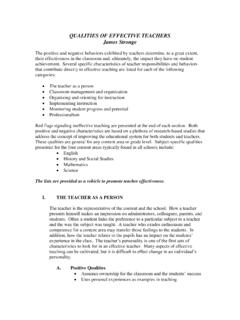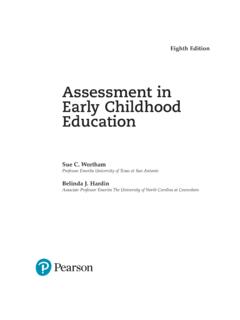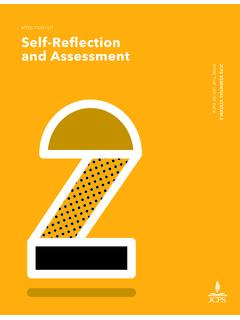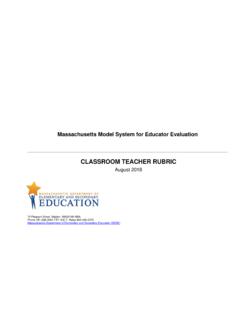Transcription of Formative assessment and the design of instructional …
1 instructional Science 18:119-144 (1989) 119 Kluwer Academic Publishers. Dordrecht - Printed in the Netherlands Formative assessment and the design of instructional systems D. ROYCE SADLER assessment and Evaluation Research Unit, Department of Education, University of Queensland, StJ~ucia, Queensland 4067, Australia Abstract. The theory of Formative assessment outlined in this article is relevant to a broad spectrum of learning outcomes in a wide variety of subjects. Specifically, it applies wherever multiple criteria are used in making judgments about the quality of student responses. The theory has less relevance for outcomes in which student responses may be assessed simply as correct or incorrect. Feedback is defined in a particular way to highlight its function in Formative assessment .
2 This definition differs in several significant respects from that traditionally found in educational research. Three conditions for effective feedback are then identified and their implications discussed. A key premise is that for stu- dents to be able to improve, they must develop the capacity to monitor the quality of their own work during actual production. This in tum requires that students possess an appreciation of what high qual- ity work is, that they have the evaluative skill necessary for them to compare with some objectivity the quality of what they are producing in relation to the higher standard, and that they develop a store of tactics or moves which can be drawn upon to modify their own work. It is argued that these skills can be developed by providing direct authentic evaluative experience for students.
3 instructional systems which do not make explicit provision for the acquisition of evaluative expertise are deficient, because they set up artificial but potentially removable performance ceilings for students. Introduction This article is about the nature and function of Formative assessment in the devel- opment of expertise. It is relevant to a wide variety of instructional systems in which student outcomes are appraised qualitatively using multiple criteria. The focus is on judgments about the quality of student work: who makes the judg- ments, how they are made, how they may be refined, and how they may be put to use in bringing about improvement. The article is prompted by two overlapping concerns. The first is with the lack of a general theory of feedback and Formative assessment in complex learning settings.
4 The second concern follows from the common but puzzling observation that even when teachers provide students with valid and reliable judgments about the quality of their work, improvement does not necessarily follow. Students often show little or no growth or development despite regular, accurate feedback. The concern itself is with whether some lear- ners fail to acquire expertise because of specific deficiencies in the instructional system associated with Formative assessment . The discussion begins with definitions of feedback, Formative assessment and qualitative judgments. This is followed by an analysis of certain patterns in teacher-student assessment interactions. A number of causal and conditional 120 linkages are then identified. These in turn are shown to have implications for the design of instructional systems which are intended to develop the ability of students to exercise executive control over their own productive activities, and eventually to become independent and fully self-monitoring.
5 Formative assessment , feedback and self-monitoring Etymology and common usage associate the adjective Formative with forming or moulding something, usually to achieve a desired end. In this article, assessment denotes any appraisal (or judgment, or evaluation) of a student's work or perfor- mance. (In some contexts, assessment is given a narrower and more specialized meaning; some North American readers in particular may prefer to substitute the term evaluation for assessment .) Formative assessment is concerned with how judgments about the quality of student responses (performances, pieces, or works) can be used to shape and improve the student's competence by short-circuiting the randomness and ineffi- ciency of trial-and-error learning. Summative contrasts with Formative assessment in that it is concerned with summing up or summarizing the achievement status of a student, and is geared towards reporting at the end of a course of study especially for purposes of certifi- cation.
6 It is essentially passive and does not normally have immediate impact on learning, although it often influences decisions which may have profound educa- tional and personal consequences for the student. The primary distinction between Formative and summative assessment relates to purpose and effect, not to timing. It is argued below that many of the principles appropriate to summative assess- ment are not necessarily transferable to Formative assessment ; the latter requires a distinctive conceptualization and technology. Feedback is a key element in Formative assessment , and is usually defined in terms of information about how successfully something has been or is being done. Few physical, intellectual or social skills can be acquired satisfactorily simply through being told about them.
7 Most require practice in a supportive environment which incorporates feedback loops. This usually includes a teacher who knows which skills are to be learned, and who can recognize and describe a fine perfor- mance, demonstrate a fine performance, and indicate how a poor performance can be improved. Feedback can also be defined in terms of its effect rather than its informational content: "Feedback is information about the gap between the actual level and the reference level of a system parameter which is used to alter the gap in some way" (Ramaprasad, 1983, p. 4). This alternative definition emphasizes the system -control function. Broadly speaking, feedback provides for two main audiences, the teacher and the student. Teachers use feedback to make program- matic decisions with respect to readiness, diagnosis and remediation.
8 Students use 121 it to monitor the strengths and weaknesses of their performances, so that aspects associated with success or high quality can be recognized and reinforced, and unsatisfactory aspects modified or improved. An important feature of Ramaprasad's definition is that information about the gap between actual and reference levels is considered as feedback only when it is used to alter the gap. If the information is simply recorded, passed to a third party who lacks either the knowledge or the power to change the outcome, or is too deeply coded (for example, as a summary grade given by the teacher) to lead to appropriate action, the control loop cannot be closed and "dangling data" substi- tute for effective feedback. In any area of the curriculum where a grade or score assigned by a teacher constitutes a one-way cipher for students, attention is diverted away from fundamental judgments and the criteria for making them.
9 A grade therefore may actually be counterproductive for Formative purposes. In assessing the quality of a student's work or performance, the teacher must possess a concept of quality appropriate to the task, and be able to judge the stu- dent's work in relation to that concept. But although the students may accept a teacher's judgment without demur, they need more than summary grades if they are to develop expertise intelligently. The indispensable conditions for improve- ment are that the student comes to hold a concept of quality roughly similar to that held by the teacher, is able to monitor continuously the quality of what is being produced during the act of production itself, and has a repertoire of alternative moves or strategies from which to draw at any given point.
10 In other words, stu- dents have to be able to judge the quality of what they are producing and be able to regulate what they are doing during the doing of it. As Shenstone (correctly) put it over two centuries ago, "Every good poet includes a critick; the reverse will not hold" (Shenstone, 1768, p. 172). Stated explicitly, therefore, the learner has to (a) possess a concept of the stan- dard (or goal, or reference level) being aimed for, (b) compare the actual (or cur- rent) level of performance with the standard, and (c) engage in appropriate action which leads to some closure of the gap. These three conditions form the organiz- ing framework for this article. It will be argued that they are necessary conditions, which must be satisfied simultaneously rather than as sequential steps.





